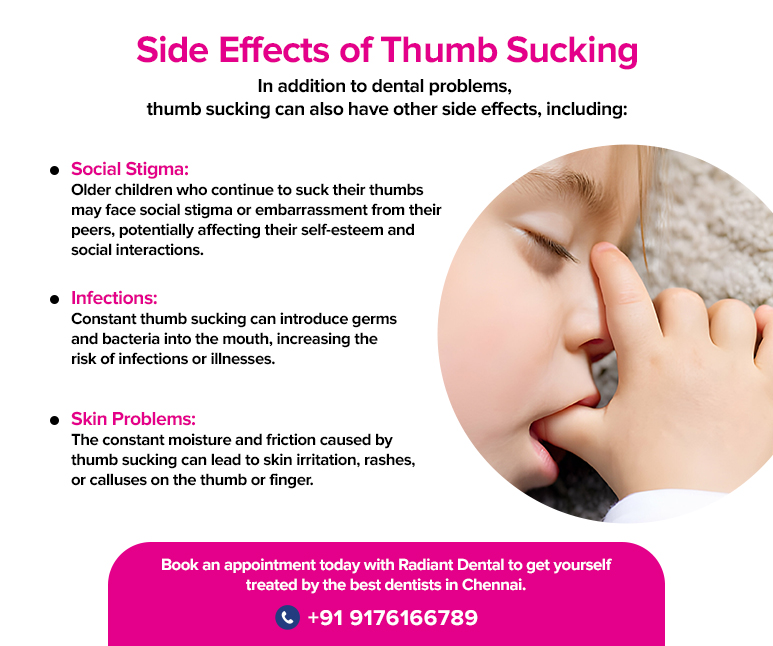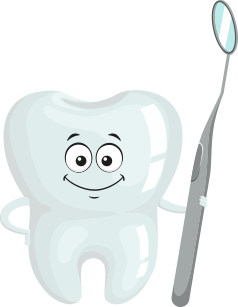How Does Thumb Sucking Affect the Teeth?

Thumb sucking is a common habit among young children, providing them with a source of comfort and security. However, this seemingly harmless behaviour can have harmful effects on a child’s dental health if left unchecked. In this blog, we will explore the potential effects of thumb sucking on teeth and discuss effective strategies to break this habit.
Effects of Thumb Sucking on Teeth
Prolonged thumb sucking can lead to various dental issues, including:
Misalignment of Teeth (Malocclusion)
The constant pressure exerted by the thumb or finger on the teeth and jaws can cause the front teeth to protrude outward while the back teeth are pushed inward. This misalignment, known as an open bite or overjet, can make it difficult for the upper and lower teeth to meet properly when biting or chewing.
Narrowing of the Upper Jaw
The repetitive sucking motion can cause the upper jaw to narrow, leading to a crossbite. This condition occurs when the upper teeth bite inside the lower teeth, causing an abnormal bite pattern and potential jaw pain or discomfort.
Speech Difficulties
As the teeth become misaligned due to thumb sucking, it can affect the proper positioning of the tongue and lips, leading to speech difficulties or even a lisp.
Dental Problems
Thumb sucking can also contribute to other dental issues, such as tooth decay, gum irritation, and even tooth loss in severe cases. The constant exposure to saliva and potential bacteria can increase the risk of tooth decay, while the pressure from the thumb can cause gum inflammation or recession.
Side Effects of Thumb Sucking
In addition to dental problems, thumb sucking can also have other side effects, including:

How to Stop Thumb Sucking?
Breaking the thumb-sucking habit can be challenging, but there are several strategies that parents and children can employ:
- Positive Reinforcement
Encourage and praise your child when they refrain from thumb sucking. Offer rewards or incentives for successful periods without the habit.
- Thumb Sucking Deterrents
Consider using bitter-tasting nail polish, bandages, or specialised thumb guards to discourage the behaviour. These products can make thumb sucking less appealing and help break the habit.
- Distraction and Substitution
Provide your child with alternative comfort items, such as stuffed animals or soothing toys, to help them cope with stress or anxiety without resorting to thumb sucking.
- Professional Help
If the habit persists despite your efforts, consult with a paediatric dentist or orthodontist at the kids dental clinic. They can recommend effective treatments, such as oral appliances or behaviour modification techniques.
Thumb Sucking Treatment
In some cases, more intensive treatment may be required to address the consequences of prolonged thumb sucking. These treatments may include:
- Orthodontic Appliances: If the teeth have become severely misaligned due to thumb sucking, orthodontic appliances for kids like braces or clear aligners may be necessary to correct the bite and realign the teeth.
- Speech Therapy: If thumb sucking has led to speech difficulties, a speech therapist can provide exercises and techniques to improve pronunciation and articulation.
- Psychological Support: In some instances, thumb sucking can be a coping mechanism for stress or anxiety. A child psychologist or counsellor can help identify and address the underlying issues contributing to the habit.
Conclusion
While thumb sucking is a natural and comforting behaviour for young children, it is essential to address the habit before it leads to more severe dental or developmental problems. By implementing consistent strategies and seeking professional help when necessary, parents can help their children break the thumb sucking habit and promote healthy dental development.
If you are seeking professional help and looking for a dental hospital in Chennai, We have a team of expert dentists who know how to deal with children and provide effective treatments. Radiant Dental Care is here to help you. Book an appointment today to know more about our services or call us at +91 9176166789.
FAQs
At what age should thumb sucking be stopped?
Most dental experts recommend discouraging thumb sucking after the age of 4. While it’s a natural habit for young children, prolonged thumb sucking beyond this age can lead to dental issues like misaligned teeth and jaw problems.
What are the signs that thumb sucking is affecting my child’s teeth?
Some common signs that thumb sucking is impacting your child’s teeth include protruding front teeth, an open bite (where the top and bottom teeth don’t meet properly), narrowing of the upper jaw, and speech difficulties like a lisp.
How can I help my child stop thumb sucking?
There are several strategies you can try, such as praising and rewarding your child when they don’t suck their thumb, using bitter-tasting nail polish or thumb guards to discourage the habit, providing alternative comfort items, and seeking professional help from a dentist or therapist if needed.
Can thumb sucking cause permanent damage to my child’s teeth?
In most cases, the dental effects of thumb sucking are reversible if the habit is stopped at an early age. However, if thumb sucking persists for several years, it can lead to more permanent issues like significant tooth misalignment, jaw problems, and changes in the shape of the mouth and palate.
Is thumb-sucking harmful to my child’s overall health?
While thumb sucking primarily affects dental health, it can also lead to other issues like skin irritation or infections from constant moisture and contact with germs. Additionally, older children who continue thumb sucking may face social stigma or self-esteem issues.

 +91 9513446186
+91 9513446186
